Year's Ban For Actresses Who Remove Hijab Under New Law

Actresses who remove hijab in Iran face a ban from performances of up to year under a new bill.

Actresses who remove hijab in Iran face a ban from performances of up to year under a new bill.
Measures already in place to punish female artists and athletes will be worsened by the legislation now going through parliament, news daily Entekhab reports.
A government spokesperson said the bill proposed by the Judiciary regarding hijab was reviewed and approved by the government and sent to the legislature last week.
The penalty will be a ban from all cultural activities for at least three months and up to a maximum of a year.
Even when anonymous, women found to have transgressed rules over the removal of veil, nudity and wearing thin clothes can now be identified through smart technology.
Those found guilty will initially be warned and fined up to three times, and in case of repeating the crime for the fourth time, they will be referred to the judicial authority.
If the hijab is removed in a car, after two warnings and a fine, the vehicle will be stopped for seven days. Civil servants working at state organizations will be prosecuted through the supervisory mechanisms up to three times, and the hijab remover finally will be referred to the judicial authorities.
Four decades after the Islamic Republic forced women to wear headscarves, long tunics and trousers, or the long black veil called chador, women are increasingly appearing in public in regular clothing such as colorful dresses and with no headscarf covering their hair.
A survey carried out by the ministry of Islamic guidance in 2015 showed that more than 70 percent of Iranians did not agree with compulsory hijab.
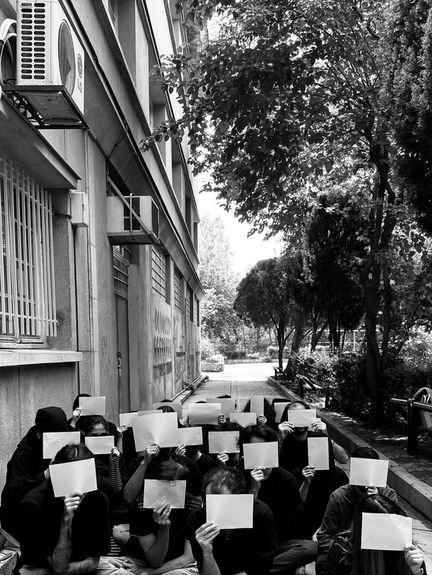
Students at universities across Iran have staged demonstrations over the execution of three political prisoners.
The protests on Saturday follow the hanging a day earlier of Saeed Yaqoubi, Saleh Mirhashmi and Majid Kazemi by the regime.
Wearing black in mourning for the three men, students at Beheshti, Modarres and Zanjan Universities gathered on campus in protest.
The executions on charges of killing two members of the Basij paramilitary force and a police officer came after a trial described as a travesty of justice by human rights campaigners.
The gathering in Beheshti university took place despite police threatening to arrest one of the students in a phone call.
Activists say the security agents "physically confronted” students, even beating them up. Members of the security forces attacked female students, forcibly removing their masks so they could be identified.
Defiant protestors chanted “Death to the Dictator”, and “Woman, Freedom, Life”.
Students at Zanjan and Modarres universities also staged sit-ins, wearing black clothes and chanting anti-regime slogans.
Friday's executions brought to at least seven the number of protesters hanged since nationwide protests broke out last September, in one of the greatest challenges to the Islamic Republic since the 1979 revolution.
The protests were initially sparked by the death of 22-year-old Mahsa Amini in the custody of Iran's morality police.
Opposition rallies have been held outside the prisons where the executions have been taking place, while the international community has voiced its outrage over the breaches of human rights.
However, nothing seems to be stopping the Islamic Republic regime in its tracks as it continues on its killing spree in an attempt to squash political opposition through terror.
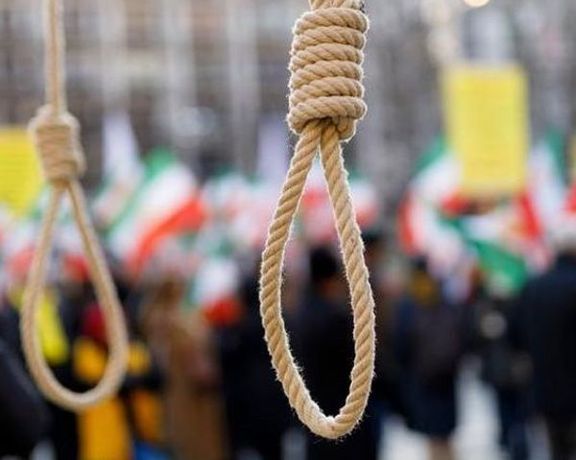
Three prisoners were executed for drug-related offences in Iran as protesting families were shot and tear-gassed outside the jail.
Saeed Garavand, Samad Garavand and Shahab Mansouri Nasab Garavand were hanged Saturday at Ghezel Hesar Prison in Karaj, Kurdish rights group Hengaw reported.
The men, all from Kouhdasht in Lorestan province, were sentenced to death by the judiciary on drug-related charges five years ago.
Families of the prisoners and opponents of the death penalty gathered in front of Ghezel Hesar prison in protest. However, regime forces intervened, using tear gas and shotguns to disperse them.
Hengaw wrote that more than ten protestors, mostly women, were wounded in the head, face, arms, legs, and abdomen.
Hengaw also announced that another man, Asef Shahbakhsh, was hanged in Zahedan prison southeast of Iran also on Saturday, while an alleged human trafficker, Shahrooz Sokhanvari was executed on the same day.
This means at least five prisoners have been executed in Iran on Saturday alone, as the death toll for the Islamic Republic’s execution spree rapidly closes in on 600 for the year so far.
The US-based Human Rights Activists News Agency (HRANA) had announced on Wednesday that Sokhanvari had been transferred to Rajaeeshahr prison in Karaj for the execution, while seven other prisoners were transferred to solitary cells in the Ghezel Hesar prison of Karaj to be hanged.

A man has been executed in Iran for leading a human trafficking and prostitution ring, according to state officials.
The judiciary's Mizan Online news website said that Shahrouz Sokhanvari was hanged Saturday morning after his sentence was confirmed in the supreme court.
The report said that Sokhanvari was charged with "corruption on earth" for "establishing and managing a wide network of prostitution at the international level that has been attracting Iranian and foreign girls".
Sokhanvari left Iran in 1983, living in India, Malaysia, the United Arab Emirates, Ukraine, and the US before authorities captured him overseas and returned him to Iran in 2020, according to Mizan.
The report did not mention the country of detention or the process that led to his arrest.
The execution of Sokhanvari came a day after three men were hanged for killing three members of the security forces at a demonstration in Isfahan on November 16.
Human rights organizations based outside Iran strongly condemned both Friday's executions and the earlier trials that led to the convictions of the three men without any reliable evidence against them.
According to the Oslo-based Iran Human Rights, more than 220 people have been executed in Iran since the beginning of the year.
Human rights organizations, including Amnesty International, claim that the country executes more people every year than any other nation with the exception of China.
This year has seen at least 582 executions in Iran, the highest number since 2015, according to the two groups.
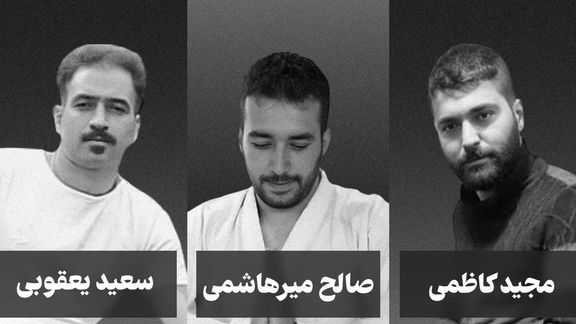
The Iranian regime’s execution of three protesters, despite numerous global pleas, has outraged Western governments and people around the world.
The Islamic Republic executed Majid Kazemi, Saeed Yaghoubi and Saleh Mirhashemi on Friday morning over trumped up charges after extracting forced confessions, in a case described as a travesty of justice. Human rights campaigners say they were tortured into confessions, and there was no reliable evidence against them.
Friday's executions brought to at least seven the number of protesters hanged since the beginning of the nationwide protests last September, which turned into one of the boldest challenges to the clerical rulers since the 1979 revolution.
The protests were ignited by Mahsa Amini's death in the custody of Iran's morality police.
In anticipation of their imminent execution, the three men on Wednesday appealed in a handwritten note for public support, saying, "Don't let them kill us".
"We need your help," said the note that went viral on social media, drawing local and international appeals to halt the executions, including from Washington.
Iranians are outraged and frustrated over the hangings; frustrated that their protest rallies outside the prison where they were held failed to halt the executions and outraged that calls by the international community did not stop the Islamic Republic from hanging people who protested against its injustice.
People in numerous neighborhoods in the capital Tehran as well as Esfahan (Isfahan) and several other cities across Iran poured out into the streets, chanting slogans against the regime and calling for its downfall.
In Tehran’s neighborhoods of Sattar Khan, Tehran Pars, Ekbatan and several others, as well as numerous neighborhoods in Esfahan and Kurdish majority cities of Mahabad and many others protests took place. There are unconfirmed reports of security forces clashing with the protesters.
Leading Iranian opposition figure exiled prince Reza Pahlavi said, “Despite the brave protests of our compatriots, the Islamic Republic has hanged three young protesters in Esfahan.”
“This murderous regime is emboldened by the West’s inaction. Those nations that claim to stand for human rights must recall their ambassadors from Tehran immediately. Iranian lives matter.”
Condemning the executions, a US State Department spokesperson said that Washington joins the Iranian people and their families in mourning the deaths of these three men.
“As we have said, it is clear from this episode that the regime has learned nothing from the protests that began in September of last year. It is no wonder so many young people in Iran are calling for change or leaving the country in droves.”
The US once again urged Iran's leadership to stop the killing, stop the sham trials, and respect people’s human rights, said the spokesperson, adding, “Sadly, we have no expectation that they will do so.”
"That is why we are continuing to work in close coordination with our allies and partners around the world to condemn and confront these appalling human rights abuses.”
Several protest gatherings were held outside the Islamic Republic’s embassies across the globe, including in Australia and Germany.
Alireza Akhondi, Swedish-Iranian member of the Swedish parliament, said that the Islamic Republic executed an average of two people per day in 2023. "But our response to these criminal monsters is persistence and courage to continue the struggle to achieve freedom." he added.
Centrist academic Sadegh Zibakalam in Tehran said Friday that “If they had not been executed, I don't think anyone would have attributed it to the system's weakness and fear of the opposition,” adding that “On the contrary, many people would consider it the regime’s respect and attention to public opinion.”
Also on Friday, the European Union condemned the hangings “in the strongest possible terms."
“The EU urges the Iranian authorities to refrain from applying the death penalty and carrying out future executions,” EU foreign policy chief Josep Borrell’s office said in a statement.
Opposition activists say the death penalty was used against the three men as an intimidation tactic to stop further protests. Iranian expatriate communities called for demonstrations against the executions in cities worldwide on Saturday, May 20.
Nazanin Boniadi, a British actor and activist of Iranian origin, tweeted that the three men had been executed “after forced confessions and sham trials.”
So far, around 500 civilians have been killed by security forces and at least 20,000 arrested. While many have been released, around 1,500 face criminal charges, and at least 80 detainees face the death sentence.
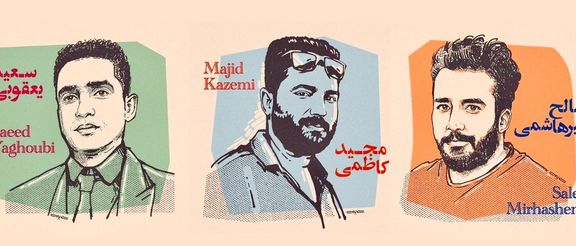
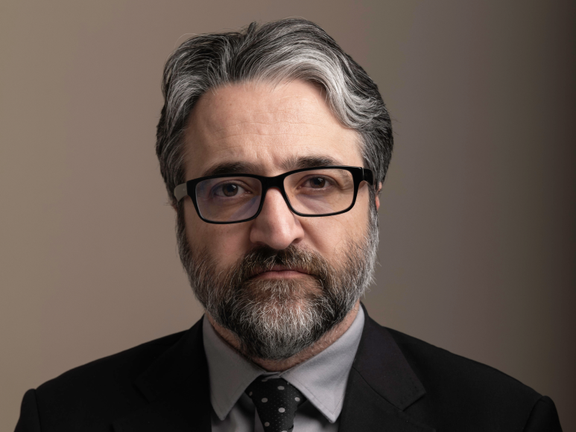
Opposition activist Hamed Esmaeilion has accused Iran of resorting to mass executions whenever it faces a threat.
But speaking to Iran International radio on Thursday, he warned the Islamic Republic regime that this time around it cannot intimidate its critics as it did with thousands of hangings in the 1980s.
Esmaeilion’s wife and daughter were killed by Iran’s Revolutionary Guard in January 2020. He was speaking hours before political prisoners Majid Kazemi, Saleh Mirhashemi and Saeed Yaqoubi were hanged on Friday morning in Isfahan. The executions have been condemned around the world.
The mass execution of prisoners in 32 cities across Iran went on for five months starting in July 1988, ordered by the Islamic Republic’s founder Rouhollah Khomeini and carried out by officials including then Deputy Prosecutor General Ebrahim Raisi, now Iran's president.
But Canada-based dissident Esmaeilion reiterated that the fall of the regime is “inevitable,” saying: "People have shown in polls and through street rallies that they have passed the Islamic Republic.
"The Islamic Republic has no chance to stay. Although the time of the fall of this regime cannot be predicted, it can be seen that the Islamic Republic is no longer capable of intimidating the people.”
Esmaeilion resigned as spokesman of families of victims of Ukrainian flight PS752 shot down by the IRGC in January 2020 to focus on his leading role in supporting Iran's protests and co-founded the Alliance for Freedom and Democracy.
The alliance announced its existence in a February event at Georgetown University and issued its charter, the Mahsa Charter, in early March based on “minimal positions” that could create the most consensus among the opposition.
However, Esmaeilion later resigned from the Alliance, blaming exiled Prince Reza Pahlavi for resisting the majority’s organizing efforts. The council consisted of Prince Reza Pahlavi, Nobel peace prize laureate Shirin Ebadi, US-based journalist and women’s rights activist Masih Alinejad, actress and activist Nazanin Boniadi and Secretary General of the Kurdish Komala Party Abdullah Mohtadi and Esmaeilion.